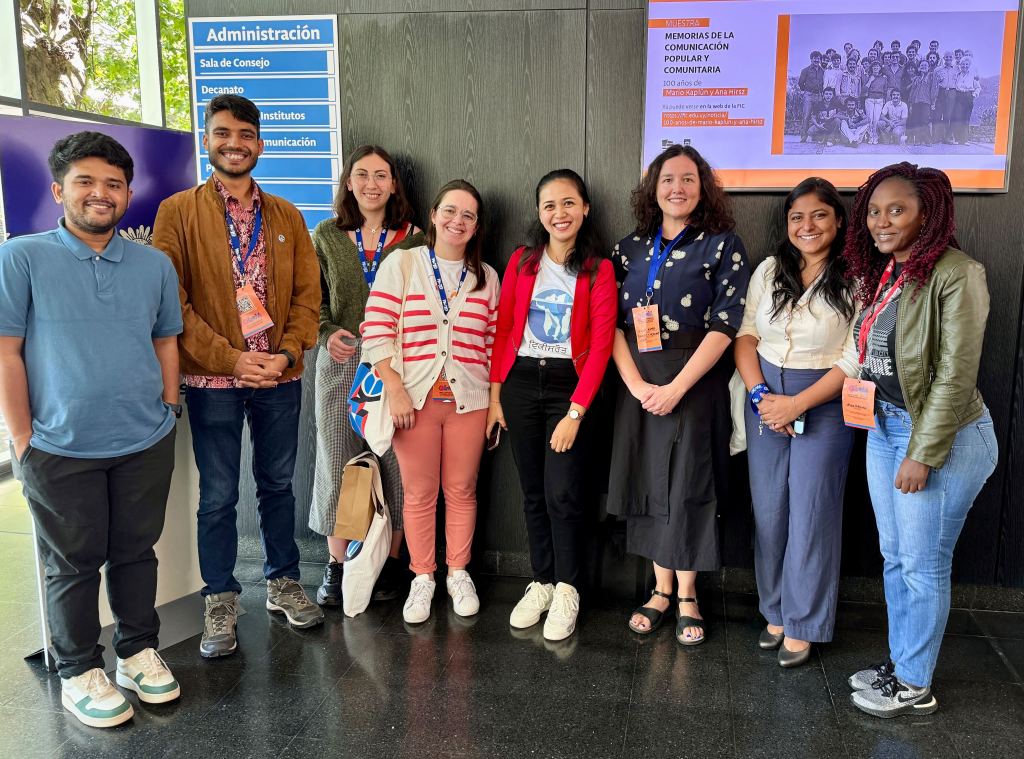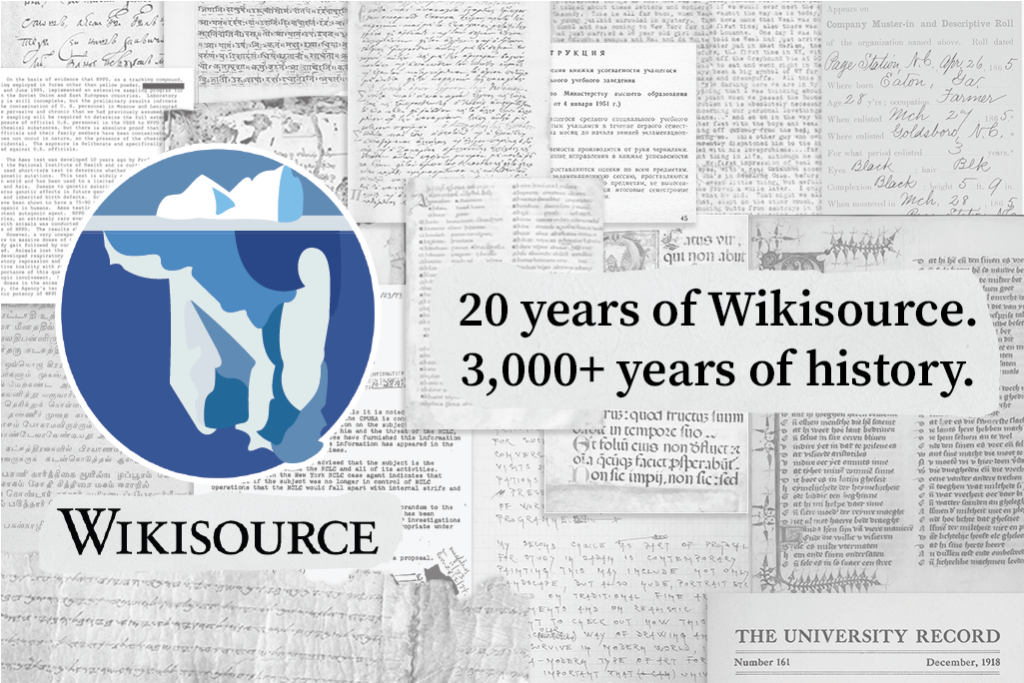Wikisource, the free online library that hosts all forms of free texts – including classic literature, historical documents, and other works that are in the public domain or freely licensed – celebrates its 20th anniversary! Here’s some highlights from the project over the last two decades and some recent events to join in the celebration of 20 years and 3,000+ years of history.
A brief history
Started on 24 November 2003, Wikisource was originally meant as a collection of supporting texts for another popular Wikimedia project, Wikipedia. It has expanded since then to become a free digital online library. The project encompasses texts from important historical documents, such as the Charte internationale des Droits de l’Homme (the Universal Declaration of Human Rights, also the first text added to Wikisource), to film scripts, poetry, letters, and even novels, such as the Strange Case of Dr Jekyll and Mr Hyde.
Wikisource is now available in 74 languages with a total of 5,869,668 sections of text (known as text units) and over 2,000 active editors. The largest Wikisource is in Polish, with 1,106,175 text units.
During Wikimania 2023, Sundanese Wikisource became the latest Wikisource to graduate out of the multilingual Wikisource.
What’s happening now on Wikisource?
As Wikisource completes 20 years, let’s recap some of the highlights of this last year:
Wikisource and its growing love for Manuscripts
Let us start by remembering Bli Bayu, who was an inspiration for the Wikisource Loves Manuscripts initiative and is survived by his wife Carma Citrawati. Carma was awarded Wikimedia Newcomer of the Year in 2021 and continues their work with Balinese manuscripts.
On the occasion of the International Mother Language Day 2023, we launched the Wikisource Wikisource Loves Manuscripts pilot in Indonesia that was led by Pusat Pengkajian Islam dan Masyarakat (PPIM) in partnership with UNESCO Jakarta and Wikimedia Indonesia. The pilot focused on digitization of manuscripts on three different islands and in three different languages of Indonesia.
The British Library collaborated with the project and shared 76 Javanese manuscripts. Some of these manuscripts are now being used to create a Transkribus model for the Javanese language.
The pilot project in Indonesia ended recently with the Wikisource Loves Manuscripts Engages Youth in Historic Manuscript Revival event, which focused on a Javanese manuscript related to Prince Diponegoro. The manuscript was inscribed in the UNESCO’s International Memory of the World Register in 2013.
We have now launched a global initiative with a learning partners network dedicated to collectively working, engaging, and advocating for the preservation of knowledge through manuscript digitization within the Wikimedia movement. This network comprises 21 members who represent 8 diverse regions worldwide and 12 different languages. If you are interested in being a part of a global network that focuses on digitizing and transcribing historical manuscripts, sign up below and we will invite you to our next cohort!

Sandeep Gill, CC BY-SA 4.0
Transforming Wikisource infrastructure
There have been various efforts to improve the Wikisource infrastructure both from the Wikimedia Foundation and the larger Wikimedia community.
Transkribus was integrated with Wikisource as a third text recognition option and is now available on 27 language versions. An AI-driven tool, Transkribus allows users to create their own handwritten text recognition (HTR) models.
Wikimedia Italy funded and supported the creation of the Edit in Sequence tool, which enables easier navigation while transcribing texts on Wikisource. The tool is now available as a beta feature on all Wikisources.
Volunteer developers have been developing exciting new tools for Wikisource such as Sangkalak (a catalog tool) and Luthor (a tool to add example usage sentences to Lexemes on Wikidata using Wikisource).
Wikisource at community gatherings
Wikisource was a highlight for many of our community gatherings this year. It received a lot of love at Wikimania 2023 and there were significant sessions related to the project. The recently concluded GLAM Wiki 2023 conference and Turkic Wikimedia conference also showcased many sessions with a particular emphasis on Wikisource.
These conferences provided hands-on editing workshops, where participants could improve their skills and learn more about Wikisource in a practical and interactive way. Through these sessions, participants have also explored the interconnectedness of our projects, such as Wikisource and Wikidata, sharing their significance in advancing open knowledge dissemination within the Wikimedia community.
Join the celebration
We’re planning a celebration and you’re invited!
https://wikisource.org/wiki/Wikisource:Twentieth_Birthday_Celebration
- First party: 6 AM UTC 24 November (check your local time)
- Second party: 5 PM UTC 24 November (check your local time)
Wikisource users are invited to share their experiences on how they began contributing to Wikisource
We’re asking people to join in on this momentous occasion. Share your stories, favorite work on Wikisource, or a simple heartfelt “Congratulations!” with us. We’ll gather up any images, videos, quotes, and stories you send in over the next few weeks and will publish a follow-up blog post. Maybe you have a story to tell about something you edited or translated, an interesting tale of what Wikisource means to you, or something you learned because of a text you found. Send your stories to sgill@wikimedia.org and look forward to a new blog post in the near future!
Further reading:
- The Power of Shared Value Partnership: CIS-A2K & ACPR- GLAM Project
- Javanese Wikisource Competition
- Making the medieval mining’s history available for all (Wikidata, Wikibase, and Wikisource opportunities)

Can you help us translate this article?
In order for this article to reach as many people as possible we would like your help. Can you translate this article to get the message out?
Start translation
